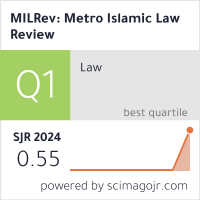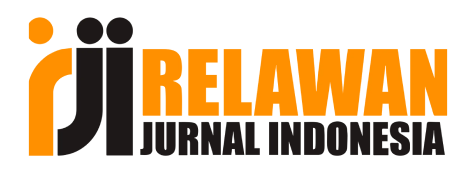Hajj Fund Investment: A Comparative Contemporary Fiqh Study on Maslahah and Public Policy Perspectives in Indonesia
DOI:
https://doi.org/10.32332/milrev.v4i1.10424Keywords:
Hajj funds, Islamic law, Maqasid al-Shari‘ah Sukuk Investment, Ta‘arudl al-Maslahah.Abstract
This study investigates the investment of Indonesian Hajj funds in domestic infrastructure projects through a comparative fiqh approach, juxtaposing classical and contemporary Islamic legal perspectives on maslahah and its application within modern public policy frameworks. The central debate lies in a perceived conflict (ta‘arudl) between two types of public benefit: preserving the economic value of pilgrims' savings through investment and ensuring their spiritual rights and religious preparedness. Drawing upon classical jurisprudence (e.g., al-Ghazali, al-Shatibi), modern ijtihad, and official fatwas from Indonesian authorities (such as the DSN-MUI), the research critically examines how these positions interact with state policies enacted by the Badan Pengelola Keuangan Haji (BPKH). Employing a qualitative analytical method, the study analyzes legal texts, government regulations, and expert interviews to validate the coexistence of economic and spiritual maslahah. The findings reveal that the government’s dual role as wakil (authorized representative) and nazir (guardian of public interest) legitimizes proactive fund management under Islamic law. Sukuk-based investments, particularly when oriented toward infrastructure that supports public welfare, are found to be consistent with the objectives of maqasid al-shari‘ah, especially hifz al-mal (protection of wealth) and hifz al-din (preservation of religion). Moreover, the study identifies that transparent governance, informed consent, and adherence to Sharia-compliant instruments are critical prerequisites for ensuring ethical legitimacy. This study concludes that a harmonized approach between Islamic jurisprudence and Indonesian public policy can sustain Hajj financing while safeguarding pilgrims' rights and welfare.
Downloads
References
Abdissalam, Izzuddin Ibn. Qawaidul Ahkam Fi Masalihil Anam. Vol. II. Bayrut: Dar Kutub Ilmiyah, 2022.
Abidin, M Zainal. “Analisis Investasi Dana Haji Dalam Pembiayaan Infrastruktur Dan Peningkatan Kualitas Penyelenggaraan Ibadah Haji.” Harmoni: Jurnal Multikultural & Multireligius 15, no. 2 (2016): 152–164.
Ahmad al-Ramli, Syamsuddin Muhammad bin. Nihayatul Muhtaj Ila Syarh Al-Minhaj. Vol. V. Bayrut: Dar Kutub Ilmiyah, 2022.
al-Din Abu Muhammad Abdullah ibn Ahmad ibn Muhammad ibn Qudamah al-Maqdisi al-Jama’ili al-Dimashqi al-Salihi al-Hanbali, Muwaffaq. Al-Mughni. Edited by Abd Allah ibn Abd al-Muhsin al-Turki and Abd al-Fattah Muhammad al-Hilu. 3rd edition. Riyadh, Saudi Arabia: Dar Alam al-Kutub li al-Tiba’ah wa al-Nashr wa al-Tawzi’, 1997.
al-Imrani, Abul Husain Yahya. Al-Bayan Fi Madzhabil Imam Al-Syafi’i (Syarh Kitab Al-Muhaddzab). Vol. VI. Bayrut: Dar al-Minhaj, 2000.
Al-Syirazi, Abu Ishaq Ibrahim. Al-Muhaddzab Fi Fiqh Al-Imam Al-Syafi’i. Vol. I. Bayrut: Dar Kutub Ilmiyah, 2022.
Ananda, Faisar, and Julhaidir Purba. “Investasi Dana Haji Untuk Pembangunan Infrastruktur Di Indonesia Dalam Pandangan Hukum Islam (Analisis Terhadap Masalahat Yang Dicanangkan Pemerintah Indonesia).” Al-Mashlahah: Jurnal Hukum Islam Dan Pranata Sosial Islam 10, no. 02 (2022): 467–476.
Arafah, Muh. “Strategi Investasi Langsung Dalam Tata Kelola Keuangan Haji Dalam Negeri.” Jurnal Imara 5, no. 1 (2021): 1–12.
Ashidiq, Abdul Rahman. “Optimalisasi Sukuk Dana Haji Indonesia Sebagai Instrumen Pembiayaan Infrastruktur (Analisis Tugas, Fungsi Dan Wewenang BPKH Dalam UU No. 34 Tahun 2014 Tentang Pengelolaan Keuangan Haji).” Az Zarqa’ 11, no. 2 (2019): 423–435.
Az Zuhailiy, Muhammad Musthofa. Al Wajizu Fi Ushi Al Fiqhal Islamiyyi. Beirut: Dar al-Khoiri, 2006.
Aziz, Roikhan Mochamad, Tia Fitriyani, Soeharjoto, Lucky Nugroho, and Syarifuddin Mabe Parenreng. “Faktor-Faktor Yang Mempengaruhi Investasi Pengelolaan Dana Haji.” Jesya Jurnal Ekonomi Dan Ekonomi Syariah 6, no. 1 (January 2022): 722–732.
Batubara, Chuzaimah, Mustapa Khamal Rokan, Muhammad Firdaus Bin Abdul Manaf, Sukiati Sukiati, and Isnaini Harahap. “Realizing Justice and Maslahah in E-Commerce: Fiqh Muamalah Insights and Challenges in Malaysia and Indonesia.” JURIS (Jurnal Ilmiah Syariah) 23, no. 2 (September 10, 2024): 253. https://doi.org/10.31958/juris.v23i2.12356.
Dewi Fransiska Mamonto, Selfrinda Rezkita Mahmud, Risnawati Utina, Geya Sukmawati, and Fahira Nadra Male. “Islamic Civil Law in Indonesia: Developments, Challenges, and Future Prospects.” NUSANTARA: Journal Of Law Studies 3, no. 02 (December 25, 2024): 50–58. https://juna.nusantarajournal.com/index.php/juna/article/view/103.
dkk, K H Arsyad. “Hasil Keputusan Bahtsul Masail FMPP Se-Jawa-Madura XXXI Di Pondok Pesantren Salaf Sulaiman, 18-19 Oktober 2017 Trenggalek Jawa Timur,” 2017.
Fauziah, Syifa, and Nurwahidin. “Pembiayaan Infrastruktur Dengan Sukuk Negara Di Indonesia: Proseddur Dan Struktur.” JIMEA, Jurnal Ilmiah MEA (Manajemen Ekonomi Dan Akuntansi) 4, no. 1 (2020): 30–42.
Harjono, Dhaniswara K., Hulman Panjaitan, and Moermahadi Soerjadjanegara. “Ensuring Fair Business Practices and Consumer Rights: The Role and Impact of Indonesia’s Consumer Dispute Settlement Agency.” Jurnal Hukum Unissula 40, no. 1 (2024). https://doi.org/http://dx.doi.org/10.26532/jh.v40i1.37177.
Hayati, Riska Fauziah, Okto Viandra Arnes, and Arwansyah Bin Kirin. “Innovation Of Online Zakat Institutions: Opportunities And Challenges In The Era Of Smart Society 5.0.” MILRev : Metro Islamic Law Review 2, no. 2 (November 15, 2023): 175. https://doi.org/10.32332/milrev.v2i2.8091.
Herliana. “Maqasid Al-Sharia in Court-Mediation Reform: A Study on Efficiency and Social Justice in Medical Disputes.” De Jure: Jurnal Hukum Dan Syar’iah 15, no. 2 (2023): 214–229. https://doi.org/10.18860/j-fsh.v15i2.23962.
Husnurrosyidah, Nur Hadi. “Investasi Keuangan Haji Melalui Sukuk Negara: Model Maqashid Syari’ah.” Akses, Jurnal Ekonomi Dan Bisnis 15, no. 2 (2020): 138–146.
ibn Idris al-Shafi’i, Muhammad. Al-Umm. 2nd edition. Beirut: Dar al-Fikr, 1983.
Muhammad al-Mawardi, Ali bin. Al-Ahkam Al-Sulthaniyyah Wa Al-Wilayat Al-Diniyyah. Misr: Dar al-Muqtabas, 2019.
Muhammad Ba’alawi, Abdurrahman bin. Bughyatul Mustarsyidin Fi Talkhisi Fatawa Ba’dli Aimmati Min Al-Ulama’ Al-Muta’akhirin. Bayrut: Dar Kutub Ilmiyah, 2022.
Nizar, Muhammad, and Sukamto. “Awareness: Dana Haji Berkeadilan Dan Berkelanjutan.” Al-Iqtishod, Jurnal Ekonomi Syariah 4, no. 2 (2022): 160–179.
Reja, R, M Hasan, and N Hakimah. “Analisis Yuridis Terhadap Isbat Nikah Yang Akad Nikahnya Oleh Wali Hakim (Studi Penetapan Pengadilan Agama Nanga Pinoh), Al-Usroh, 2022. http://e-journal.iainptk.ac.id/index.php/alusroh/article/view/706.
Republika. “BPKH Sebut Pemenuhan Tingkat Likuiditas Keuangan Haji Tetap Terjaga,” 2023.
Rifa’i, Akhmad Andi T Tenriajeng. “Analisis Kelayakan Investasi Dana Haji Untuk Pembangunan Proyek Infrastruktur Jalan Tol Jakarta-Cikampek II Elevated.” Politeknologi 20, no. 2 (May 2021): 123–133.
Rosyid, Moh. “Dinamika Haji Indonesia Sejak Era Kolonial Dan Problematika Calon Haji Ilegal.” Ijtihad : Jurnal Wacana Hukum Islam Dan Kemanusiaan 17, no. 2 (2018): 241. https://doi.org/10.18326/ijtihad.v17i2.241-259.
Safitriawati, Tita, Indar Fauziah Ulfah, and Neneng Widayati. “Optimalisasi Investasi Dana Haji Melalui Sukuk Dan Deposito Bank Syariah Terhadap Pengembangan Dana Haji Indonesia Priode 2016-2019.” BISEI: Jurnal Bisnis Dan Ekonomi Islam 06, no. 01 (June 2021): 1–12.
Sholichah, Inti Ulfi. “Hukum Investasi Produktif Pengelolaan Dana Haji Dalam Perspektif Ekonomi Syariah.” SYAR’IE 3 (February 2020): 18–34.
Siregar, M Fajri Syahroni. “Investasi Dana Haji Untuk Pembangunan Infrastruktur Di Indonesia Dalam Pandangan Islam.” Risalah: Jurnal Pendidikan Dan Studi Islam 7, no. 1 (2021): 172–193.
Sukiati, Sukiati, Rahmadany Rahmadany, Muhamad Hasan Sebyar, and Purnama Hidayah Harahap. “Copyright as a Waqf Object in the Context of Fiqh and Positive Law.” Al-Istinbat : Jurnal Hukum Islam 8, no. 1 (2023): 269–290.
Supena, Ilyas. “Konstruksi Epistemologi Fikih Pandemik: Analisis Fatwa-Fatwa MUI.” Al-Manahij: Jurnal Kajian Hukum Islam 15, no. 1 SE-ARTICLES (June 11, 2021): 121–136. https://doi.org/10.24090/mnh.v15i1.4203.
Wahyuni, Yunita, Mahia Atha Bagaskara, and Kharis Fadhlullah Hana. “Persepsi Masyarakat Kudus Mengenai Penggunaan Dana Haji Untuk Investasi Pembangunan Infrastruktur.” Al-Aqdu: Journal of Islamic Economics Law 2, no. 2 (2022): 118–127.
Witjaksono, Beny. “Analisis Kelayakan Investasi Keuangan Haji Dan Pembiayaan Infrastruktur Dan Tingkat Imbal Hasil Badan Pengelola Keuangan Haji (BPKH).” Performance 27, no. 1 (2020): 30–40.
Yandi, Akmal, and Dina Dahliana. “Perspective Analysis Mashlahah Mursalah towards Tradition Mamangkeh And Maasok Gombak in the Pre-Wedding Procession in West Sumatra.” Jurnal Hukum Keluarga 1, no. 02 (2025): 39–46. https://journal-rabiza.com/index.php/JHK/article/view/16.
Zakiruddin, Muhammad Aziz, Kamsi Kamsi, and Ahmad Bahiej. “Siyasah Syariyah Paradigm of Hajj Financial Management Regulation in Indonesia.” Al-Istinbath: Jurnal Hukum Islam 7, no. 2 November SE-Articles (December 1, 2022): 531–552. https://doi.org/10.29240/jhi.v7i2.5310.
Downloads
Published
Issue
Section
License
Copyright (c) 2025 Jaenal Aripin

This work is licensed under a Creative Commons Attribution-ShareAlike 4.0 International License.










